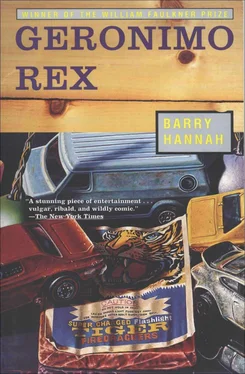Whitfield Peter’s niece was a minor dancer and chorus member. She was mama’s little darling. That’s how she looked. She was lithe and restlessly shy. Her hair was brown, pinched back, but strands fell over her ears in the heat of the dance. Just pretty enough to disturb you after a third look, and by then you wanted to take her to your chest and have her breathe on it. She was the one you came home to. She was your helpmate. I fell for her before I was certain who she was. You could tell she loved being in the musical. I felt sorry for her. The musical was such a wreck. It lunged on, a robot dream above the heads of the orchestra; people appeared and fled like costumed metronomes. Good old Livace.
Fleece passed a program down. He had underlined her name in the cast. Catherine Marie Wrag . She would be anxious to have her last name changed. Fleece had encircled Catherine . Yes. I’d read it often enough in the letters. His estranged wife. My stomach went cold. But her last name was not Lepoyster. I still loved her purely. My imagination was going crazy, but I hung on to my love for her. She held herself like she was accomplished in innocent talents that the musical was not making plain.
“Wouldn’t you love to tie that nice brown-headed piece across a barrel and work the old will?” Silas whispered in my ear during a scene that had her out front.
“No. Leave her alone,” I said.
When “Oklahoma!” was over we kept seated and let the crowd get out. A photographer was popping away at the cast. He told Catherine to move a little closer. I was even jealous of him. Watch your hands yanking her, you, you jaded bag.
Catherine ran off into the wings, and then down the aisle came her uncle. Peter had been waiting for her. He was a young pink fifty now. His hair seemed to have been waved and veneered by professional aid. And his profile — a matured fruity cupiedoll. I almost lost my supper when I saw him.
Catherine came back out with a little suitcase. Peter was at the footlights and she stepped down to him with his help. I was in the orchestra pit by then, losing myself among the musicians packing away their instruments, so I could observe her up close. I took time out to grab Livace by the elbow and tell him what I thought of his directing; Livace, still lost in his maestro-fever, was accepting it as praise, not recognizing me. I saw the first trumpet, Derrick, who used to fear me for my talent, and I clapped him on the back and asked him what he was playing nowadays. I tore his Conn Constellation out of his hands and ran my fingers over the keys, and poised there, because Catherine was just then coming by the pit ahead of Peter. She did look at me and in my eyes she must have seen the gravy of pure hopeful love because she kept looking at me until she went by. I kinked my head around then, not wanting to see Peter. When Peter passed, I set the horn down and followed.
“It was every bit simply lovely,” I heard Peter say to her. I was at his back and listened for her voice. Silas, Bet, and Fleece mobbed out into the aisle around me. Bet spoke in my ear, leaning down a bit. She had on long ear-drops and smelled like vanilla — ah, woman — which deterred me a moment.
“Bobby says to tell you ‘Please!’ He says you have a pistol, don’t your.
“I forgot the pistol. It’s the girl.”
She asked me why we were walking so fast. Go to Silas’s Pontiac, quick, everybody, I said. Peter led Catherine down the sidewalk going east, and I noticed the fins of his goosey Chrysler in a slot in the alley between buildings. I could catch him then. We were down the row just a bit. I asked Silas for the keys.
Peter eased out, and we gave chase.
On West Capitol, just beyond the Overhead Bridge, he seemed to notice us. He cut over to Woodrow Wilson, going by Livingston Park, and on the fly. But no, we sat behind his bumper, stopped at a light, and he nodded his head up and down talking delightedly to his niece. He didn’t know we were there. He was just in a terrible hurry to get home. With her.
He went over the speed limit getting up to Madison County. We hit the rougher blacktop. Then his lights swung left in a flurry of gravel. I stopped at the inception of the gravel road, pulled off, and cut the motor. The house was a half-mile down there, over a hill.
“She lives with her uncle,” said Bobby Dove.
I asked Silas wasn’t there anything to drink in that car pocket over there. There wasn’t. Well, I said, I’m going to walk on down there and see what I can see. I felt sickish and bespooked.
“I think she might need me.”
“I think it’s just great that Harry’s in love with that girl so much he’ll walk down there to see if she’s all right,” said Bet. Being an enchanted-tower sort of challenge herself, I guess she was bound to love high plights and things like that. Trysts.
“I think he’s more in heat,” said Fleece.
“Oh, uglymouth! Jerry, you go with him and don’t let anything happen to him.”
“No,” I said. “Alone is what I want.”
“Oh, marvelous,” cried Bet.
“We don’t want him to stay here,” said Fleece, meaning Silas.
This made Silas surly. He came with me. He asked me if I wanted to know a secret, by God. It was that Bet had promised to go out with him some night if he’d quit calling her. He told me it was hard to like that brittle little monkey, Fleece. I agreed. He could see that Fleece thought he had Bet trained. He wasn’t happy about their slobbering on the seatcovers of his car, whatever they did for lust together. I told him to please go back, then; he couldn’t imagine how much I didn’t want to hear about other peoples’ love careers.
‘That’s all right. I’m shutting up. That’s the shrine of love, just around the turn there, isn’t it? The honeymooners. What.. a bat? We’re really in the sticks, aren’t we?”
Yes, we were. The blackberry thickets hung on the road ledge. The moon showed foot-high corn sprouts in the field beside us. The land spoke of meager, desperation farming; of people who could not afford the machinery they did it with. We saw a weathered board house, leaning, empty. It held the souls of some sharecropper family who were burnt out to zombies before they left. We made the gate of Peter’s house and turned in to the yard, with its circular drive, high shaggy grass in the center, and otherwise the rabbit tobacco bushes, the neck-high milkweeds, and clover. We flushed out a covey of quail. Other creatures snuck away.
“What is it you want to see ? There’s his car. All right, they’re here,” says Silas. Both stories of the house were alight. There was no light on the veranda, but the living room lights made it visible. “We’re not going up and knock on the door, are we?”
I told him I really did wish he would leave, now.
“You think they’d be going to it with all these lights on? What, you want to see them. That Catherine—”
“She was a sweet, teenage child. You saw her,” I said.
“She was older than that. I thought she had a good bit of knowledge how to move her body.”
I sunk down and sat in the weeds when he said that. We were in the shadow of the hedge of the veranda and, as things turned out, too close to it.
The doors opened and out came Peter and Catherine into the warm night They were holding glasses. I heard the ice tinkling. We had got caught under a sort of single bush of the hedge. What I had already noticed on the veranda was that potted fern, of the letter. It was a thriving giant, with arms falling all over the veranda and the banisters. They came out by this fern and weren’t ten feet above us.
“Now this is what I used to really enjoy, this porch,” said Peter. “Your aunt and I spent hours out here from May through September. Now that was leisure. Your generation is so busy, you will never understand that leisure. A musical tonight, another interest tomorrow. You bounce from one event to the next. You will piece yourself out, I fear, Cathy. You will not be able to set yourself still and focus. I’m not capturing your interest any longer, am I? You aren’t having a good time in this house.”
Читать дальше












